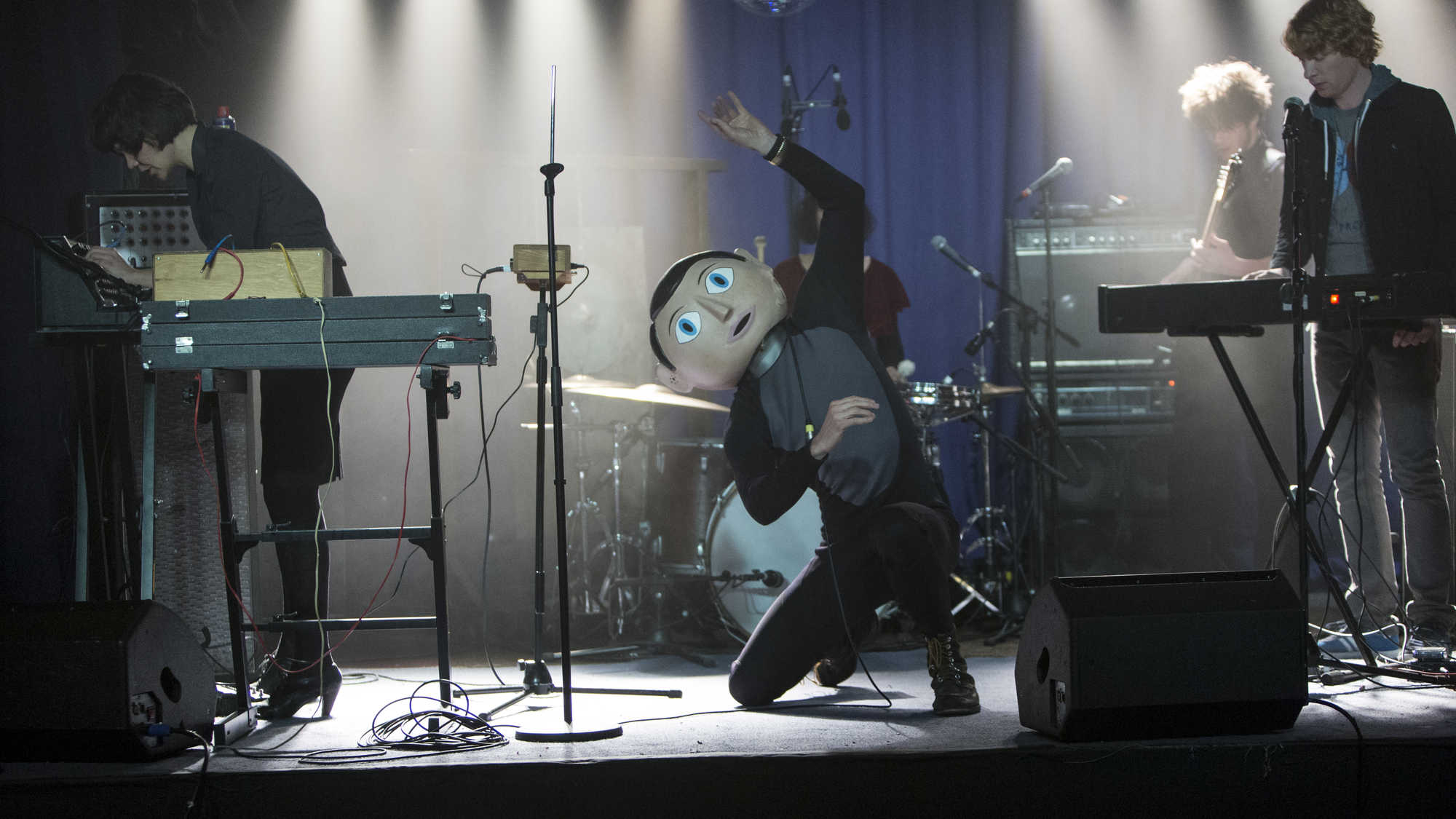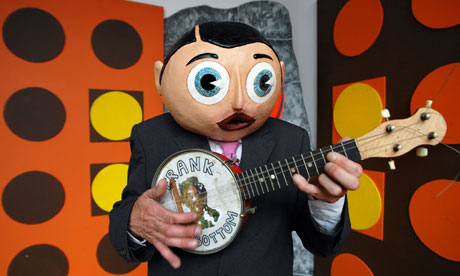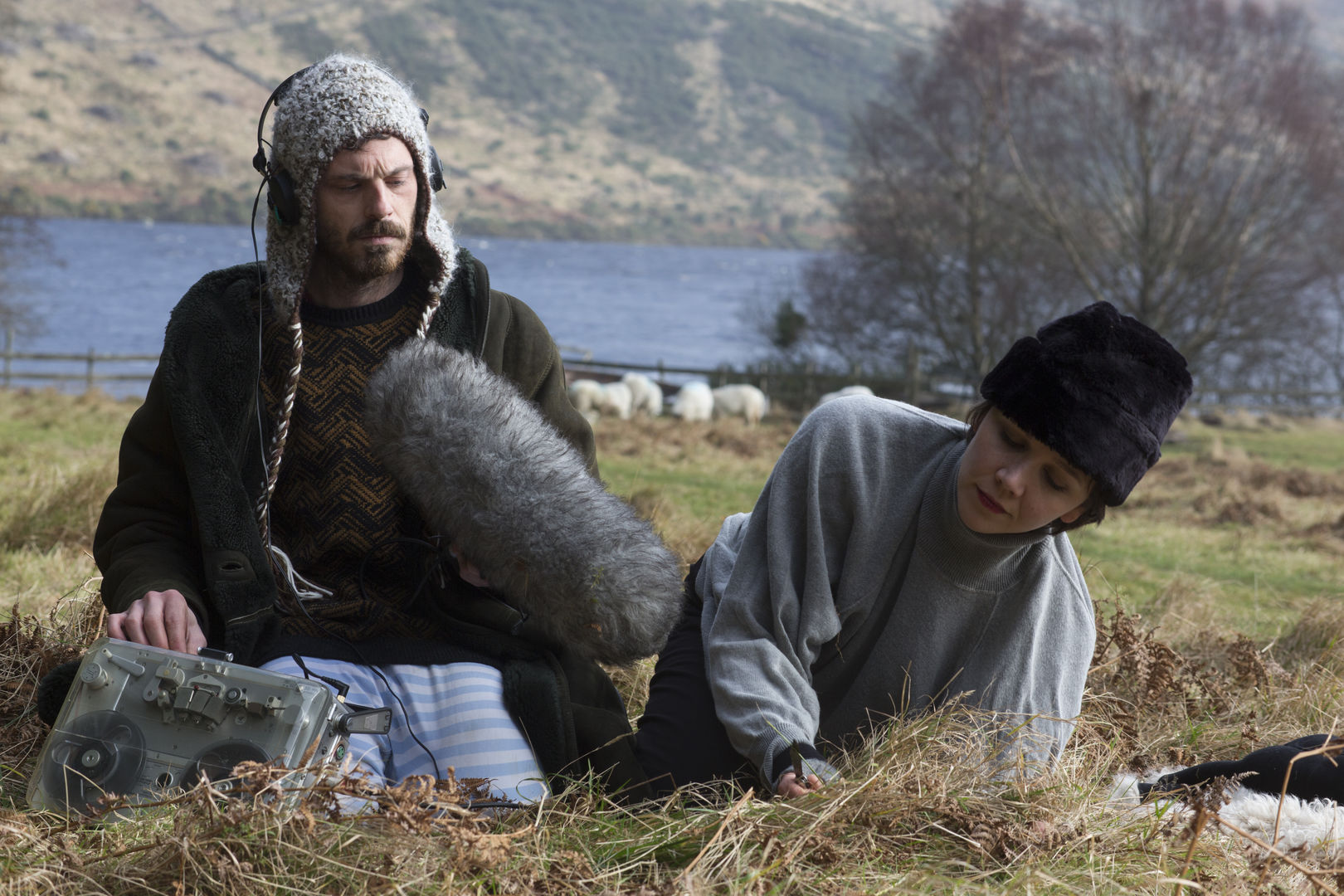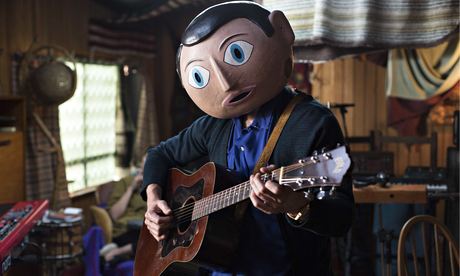At a certain point, Frank, the man in the very large papier mache head, shows up at South By Southwest, the annual Austin, Texas festival of music, film and general hipness, as it seems he must. During the brief glances we get of Frank's band, Soronprfbs (don't try to pronounce it), milling amongst the other SXSW performers and attendees, there is a brief, amusing, two-person, street summit of bodies beneath large, fabricated noggins. These big heads seem to tilt slightly in recognition, as if echoing souls from a distant, disproportionate realm who have found a fellow traveler.
While the fleeting, amusing encounter might seem to present but two characters adding flavor to the human stew about them, there's no reason to believe they're at all the same. The square, crudely-rendered, television-like head staring back at Frank is probably little more than a band's temporary gimmick, perhaps a festival attendee's costuming lark. For Frank, the oblate dome atop his shoulders with neutral blue eyes and smoothly formed black hair (like Big Boy, with a more conventional stylist) is very much a way of life.

Our entree into the tempestuous world of Frank and Soronprfbs is provided through the wide eyes of budding songwriter and rock star Jon (Domhnall Gleeson). This convergence seems particularly unlikely at the outset, given the painfully literal attempts we hear Jon make at songcraft in voiceover that opens the film. This first occurs at the seaside and later walking home in his coastal English town. "Lady in the red coat walkin' with a brown bag!" is Jon's genius lyric inspired by, well....a woman in red coat walking with a brown bag.
 But our Jon is not easily discouraged. "Working hard on songs all day. Now for dinner - hashtag nomnomnom," he Tweets to an indifferent world after his completely forgettable attempts at composition. The following day, his Twitter feed is favored with "Panini with cheese and ham #livin' the dream." But wouldn't you know it, Jon's Tweets are unburdened of their rather desperate irony when he happens to encounter an unconventional band playing in his town that night. Yes, Soronprfbs has rolled into town, no more smoothly than they roll off anybody's tongue. A row between the band that Jon first hears on an radio interview continues on the seaside where he's eating that same wondrous panini. The man thrashing around in the cold surf turns out to be the group's keyboard player. A brief conversation with Soronprfbs' American manager, Don (Scoot McNairy) elicits an offer to fill in at that evening's gig. After most of the band drive away in their van, Jon asks the paramedics if the hypothermic keyboard player will recover. It's only some cold seawater, he's assured, the man will be fine. But he'll have to stay in hospital overnight? Jon asks hopefully, demonstrating the sort of music business (or perhaps any business) ambition that often involves stepping gingerly over the bodies of one's fallen competitor's, even while sentiments of concern are feigned. Little does Jon realize that keyboard players in Soronprfbs are beginning to go the way of Spinal Tap drummers, even if their demise is arrived somewhat more typically. Step carefully indeed, young hopeful.
But our Jon is not easily discouraged. "Working hard on songs all day. Now for dinner - hashtag nomnomnom," he Tweets to an indifferent world after his completely forgettable attempts at composition. The following day, his Twitter feed is favored with "Panini with cheese and ham #livin' the dream." But wouldn't you know it, Jon's Tweets are unburdened of their rather desperate irony when he happens to encounter an unconventional band playing in his town that night. Yes, Soronprfbs has rolled into town, no more smoothly than they roll off anybody's tongue. A row between the band that Jon first hears on an radio interview continues on the seaside where he's eating that same wondrous panini. The man thrashing around in the cold surf turns out to be the group's keyboard player. A brief conversation with Soronprfbs' American manager, Don (Scoot McNairy) elicits an offer to fill in at that evening's gig. After most of the band drive away in their van, Jon asks the paramedics if the hypothermic keyboard player will recover. It's only some cold seawater, he's assured, the man will be fine. But he'll have to stay in hospital overnight? Jon asks hopefully, demonstrating the sort of music business (or perhaps any business) ambition that often involves stepping gingerly over the bodies of one's fallen competitor's, even while sentiments of concern are feigned. Little does Jon realize that keyboard players in Soronprfbs are beginning to go the way of Spinal Tap drummers, even if their demise is arrived somewhat more typically. Step carefully indeed, young hopeful. Alas, Jon's rock and roll dream is one from which he's abruptly jolted awake. Just as he's getting into the flow of the first number, yet more histrionics occur between the band's hostile theramin player Clara (Maggie Gyllenhaal) and French guitarist, Baraque (Francois Civil). Faster than you can say Sex Pistols in America, the show ends in angry feedback and an abandoned stage.
 It is on the same stage that we, as Jon, see for the first time the lead singer of Soronprfbs, sporting his trademark head and one of an enviable collection of vintage sweaters. This none other than Frank (Michael Fassbender), whose deep vocal register spoken word and singing, his herky-jerky movements, give the impression of a large, comic book version of the dearly departed Ian Curtis of Joy Division (in some other dimension, Curtis might be wishing that he had the same idea).
It is on the same stage that we, as Jon, see for the first time the lead singer of Soronprfbs, sporting his trademark head and one of an enviable collection of vintage sweaters. This none other than Frank (Michael Fassbender), whose deep vocal register spoken word and singing, his herky-jerky movements, give the impression of a large, comic book version of the dearly departed Ian Curtis of Joy Division (in some other dimension, Curtis might be wishing that he had the same idea). As with Scarlett Johannson's work in Her, one of the year's more interesting performances comes from an actor whose face we almost never see. Of course, as the computer operating system, Johannson's role was completely vocal. Beyond the vocal facility he demonstrates as Frank talks, sings and wails, Michael Fassbender delivers a robust physical presence both anxious and charismatic. Fassbender, as usual, maintains a strong and mesmerizing sense of character, even if the same cannot always be said for the film's writers and director.
Fanciful as it might seem, Frank does have some basis in actuality. Writer Jon Ronson was once part of a group called Frank Sidebottom oh Blimey, Mr. Sidebottom being the big-fake-head-wearing alter ago of the late Chris Sievey. Sievey himself was apparently influenced by the likes of Daniel Johnston and Captain Beefheart. Hence, the cinematic Frank, part naif, part genius, the alternating current of his psyche surging with a better than average helping of mental illness.
 |
| The original, if not the real Frank. Chris Sievey, a.k.a, Frank Sidebottom. |
 Altogether, this Frank is probably a bit vague, a bit too much, although Ronson and Straugham avoid facile reductions like having Frank's Bluff, Kansas home turn out to be some sort of miasma of mental ill health from which he emerged, scarred but brilliant. So Jon imagines Frank's childhood until he visits the unassuming suburban house and amiable parents of Frank toward film's end. The kindly but disturbed in his own right (a thing, shall we say, for mannequins) Don, manager and former keyboard player, explains to Jon early on that that he and Frank met in a mental hospital and despite the lead singer's obvious issues, "he's the sanest cat I've ever known." Still, Jon can't help envying the dysfunction, which be believes a font of genius. When the rehearsals and recording session in Ireland stretch to month after intense month, the time reflected in Jon's increasingly bushy red beard, he thinks he's finally found his own fertile ground of mental discord. "I have found my abusive childhood," he muses, "my mental hospital."
Altogether, this Frank is probably a bit vague, a bit too much, although Ronson and Straugham avoid facile reductions like having Frank's Bluff, Kansas home turn out to be some sort of miasma of mental ill health from which he emerged, scarred but brilliant. So Jon imagines Frank's childhood until he visits the unassuming suburban house and amiable parents of Frank toward film's end. The kindly but disturbed in his own right (a thing, shall we say, for mannequins) Don, manager and former keyboard player, explains to Jon early on that that he and Frank met in a mental hospital and despite the lead singer's obvious issues, "he's the sanest cat I've ever known." Still, Jon can't help envying the dysfunction, which be believes a font of genius. When the rehearsals and recording session in Ireland stretch to month after intense month, the time reflected in Jon's increasingly bushy red beard, he thinks he's finally found his own fertile ground of mental discord. "I have found my abusive childhood," he muses, "my mental hospital."  As for the rest of Soronprfbs, one could say that Ronson and Straugham show considerable patience in developing these characters, which would be a polite way of saying that Clara, Baraque and drummer Nana (Carla Azar) all operate in one intense, darkly-clad dimension for most of the film. Gyllenhaal apparently first turned down the chance to play Clara because she simply didn't understand the character. One can appreciate her bewilderment. Gyllenhaal defaults to an expression of seething scorn most of the way, usually directed to the interloper Jon, but sometimes even to her beloved Frank. Overall, her performance is like a radio tuned to one end of the dial at which extreme only a rough and wavering signal comes through. "Get away from my fucking theramin!," or "Someone needs to punch you in the face" are typical blasts of dialog from the sunny Clara.
As for the rest of Soronprfbs, one could say that Ronson and Straugham show considerable patience in developing these characters, which would be a polite way of saying that Clara, Baraque and drummer Nana (Carla Azar) all operate in one intense, darkly-clad dimension for most of the film. Gyllenhaal apparently first turned down the chance to play Clara because she simply didn't understand the character. One can appreciate her bewilderment. Gyllenhaal defaults to an expression of seething scorn most of the way, usually directed to the interloper Jon, but sometimes even to her beloved Frank. Overall, her performance is like a radio tuned to one end of the dial at which extreme only a rough and wavering signal comes through. "Get away from my fucking theramin!," or "Someone needs to punch you in the face" are typical blasts of dialog from the sunny Clara. Through the early stages of Frank, Clara, as the most prominent and emblematic member of Sornoprfbs not wearing a papier-mache head, is indicated as much by costume as complexity of character. Sound at all familiar, art house regulars? Miiiister Anderson. We, of course, speak of Wes and not P.T (or Neo). As the band settles into its rustic Irish retreat, goes about its field work and begins to rehearse, Frank veers sharply toward Andersonia. Cue the montage of the band going about arcane rituals, Clara's upright fur hat flying like a flag of preciousness and Stephen Rennicks' score (at its worst, with manic mandolin and saccharin bells like a music box with the dry heaves) sounding entirely too like the pop baroque with which Mark Mothersbaugh has adorned the films of Wes Anderson. Altogether, it's a lot of sugar this already rich recipe hardly needs.
 |
| Chinchilla! Francois Civil, very much in need of the band's safe word in Frank. |
Domhnall Gleeson is near perfect, running a subtle range from innocent outsider to ultimately destructive influence, genially dragging the rest of the band toward the mainstream.
The character of Frank might not entirely make sense, but the film's ruminations on normalcy and mental illness, success and artistic satisfaction are insightful while avoiding obvious conclusions. Frank's need to withdraw, to don the big papier-mache head, might not be anything to romanticize or emulate, but neither is striving for popular acceptance at the cost of artistic identity. And sometimes, culture's greatest threat to artistic vitality comes not from its blatant philistines but from its seemingly well-meaning mediocrities: the docents expounding from partial knowledge and little insight; the gushing PBS pledge drive hosts whose attempts at cultural arbitration could hardly be more conservative; the sweet guy longing for stardom who should probably be kept out of the band at all cost.
Stephen Rennicks' score might be cloying as it accompanies director Lenny Abrahamson's ill-advised detour into Andersonia, but his original songs, written with the director and various of the cast members, provide the film and the fictional band with a kind of life blood, without which it all might seem little more than a twee exercise. A film about an artist or band that doesn't rely upon established material tends to live or die by how credible are such songs composed for the occasion. With Frank, the compositions are strong enough to be credible, different enough to validate the idea of a gifted but troubled lead singer and band. These tunes run from the bombastic ("Secure the Galactic Perimeter") to the hilariously bad ("Frank's Most Likable Song...Ever") to the outright moving ("I Love You All").
Frank and his reunited band are seemingly add-libbing "I Love You All" in some lost Texas bar as we leave them at film's end. By this time, Jon is wise enough to walk away and leave the group to itself, the ginger bird necessarily flying from the rare aviary which is Soronprfbs. The camera follows him out of the bar and down the street. Best that we all leave such rare birds to their own space and their own strange plumage.
db





Good review Danny. One question I had was what song was Jon starting to play when the cross-dressed Frank has his meltdown at SXSW?
ReplyDeleteJimmy,
ReplyDeleteIt's been quite a while since I've seen Frank, but I believe that song (which I don't see credited in the soundtrack) was just one of Jon's. Sorry I don't have a more specific answer. Thanks very much for reading. db